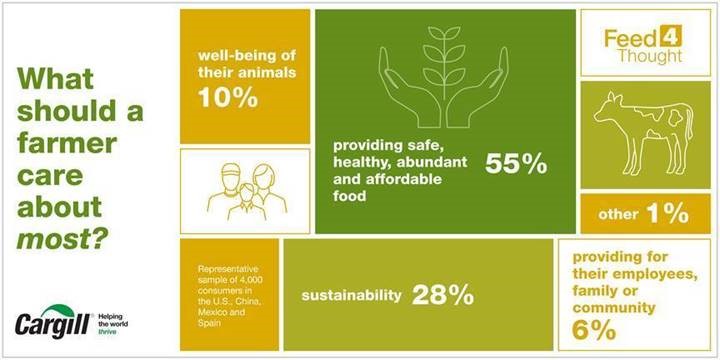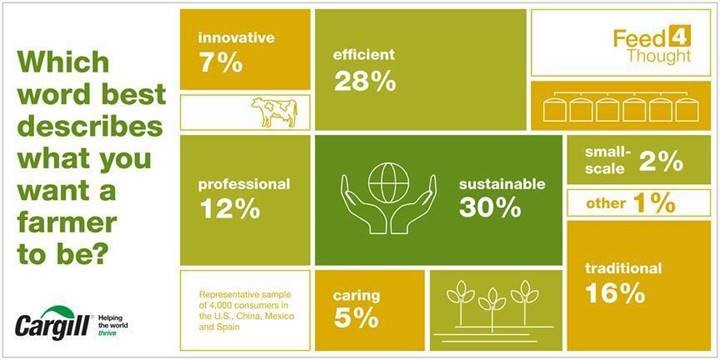



High consumer expectations, low levels of appreciation make it tough to be a farmer, finds new research
Add conflicting consumer expectations to the list of reasons farming is a tough row to hoe.In its new global study, Cargill found consumers had a hard-to-satisfy wish list for those who put food on our tables—with most claiming to feel knowledgeable about how our food is raised. Farmers should care most about “providing safe, healthy, abundant and affordable food,” said a majority of survey takers. Yet those same respondents would prefer their food come from smaller/speciality, local or organic farms—which can’t necessarily compete on cost.

© Cargill
“Farmers are foundational to feeding the world in a safe, responsible and sustainable way,” says Pilar Cruz, president of Cargill’s feed and nutrition business. “But they do so under pressure. On one hand, affordable food is central to many families’ budgets. On the other, people are questioning the farming approaches that have made food more available and affordable. Cargill sees all viewpoints because we partner with farmers, food companies, and beyond. So, we work to raise awareness and foster understanding across the value chain. Chairing the US Global Leadership Coalition’s Heartland Tour, a partnership aimed at showcasing and advancing ways for local farming to contribute to global progress, is one example.”
In its latest Feed4Thought survey, Cargill found half the people surveyed in the US, China, Mexico and Spain saw a farmer, primarily, as a “person who feeds the world.” Just a quarter chose “steward of the earth’s natural resources”—perhaps reflecting that one-third of contributors doubted the long-term sustainability of today’s agriculture. They want farmers to be sustainable though: “Sustainable” was the word that best described what participants wanted a farmer to be. Efficient was second.

© Cargill
“Farmers are trying to feed the world and protect the earth’s resources and provide for their families,” says Heather Tansey, sustainability lead for Cargill’s protein and animal nutrition businesses. “These are not mutually exclusive. Farmers around the world are adopting conservation practices to nourish people, the planet and the health of their businesses. Initiatives like BeefUp Sustainability, aimed at reducing greenhouse gas emissions in partnership with farmers, ranchers and other innovators; farmer prosperity training, which nurtures sustainable practices and incomes for smallholder farmers; and Techstars Farm to Fork Accelerator, a partnership to solve big nutrition challenges with technology, can help.”
Three-quarters of Feed4Thought respondents thought technologically advanced farming was a good thing. But that’s not exactly how they see farmers today. “Technologically savvy” was one of the terms least associated with farmers. Contrast this with the approach of long-term Cargill customer, Coldstream Farms in Washington state, US, a dairy operation where innovation helps do everything from reducing feed loss to minimising lameness to turning manure into drinkable water for cows and chemical-free fertiliser.
“I think the common image of ‘farmer’ remains pitchfork-in-hand, standing in a field,” says Galen Smith, who co-owns Coldstream Farms. “Today’s farmer is far from that. I spend a lot of time researching new technologies, understanding herd trends and finding ways to steer us on a more sustainable course. We’re passionate about nurturing animals and are continually trying to do a better job of educating people on what happens on a dairy farm.”
“We need farmers to tell their stories. We need sound science and reliable data,” agrees Gabriel Carballal, a Uruguayan member of the Global Farmer Network, who works closely with Cargill. “The only impediment to a desirable outcome for all is accurate information about how farming and food production really work.”
Survey findings suggest a need to engage consumers on animal farming in particular. Although there was a 95 percent positive view of farmers, animal protein producers were viewed less favourably than farmers who grew crops.
“It’s tough to be a farmer,” acknowledges David Webster, who grew up on a farm and leads Cargill’s animal nutrition business. “That’s why Cargill anticipates and responds to farmers’ needs in this dynamic marketplace, making them more productive, efficient and sustainable. It could be artificial intelligence that helps farmers know everything about their animals in an instant. Or sustainable alternatives to fish meal in feed, like InnovaFeed’s insect protein. Or increasing production of organic feed by 45 percent in one year—as we have at our Brittany, France plant. We’re helping make farming part of the solution to the pressing need to do more with less across the food and agriculture industry.”










